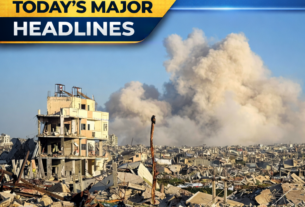Economic Boycott on Muslims: A Growing Concern in India
When the panchayat of Madhi village in Maharashtra’s Ahmednagar district banned Muslim shopkeepers from participating in the annual Kanifnath Maharaj Yatra, a local government official rejected the resolution, calling it “illegal.” However, state minister Nitesh Rane supported the resolution, stating that the official should recognize that “there is a Hindutva government in the state.” This incident highlights how the Economic Boycott on Muslims is being openly supported by influential political figures.
This annual religious fair takes place in mid-March, attracting thousands of Hindu pilgrims and traders from the district and across the state. Traditionally, people from all communities set up stalls to sell various goods. However, the Economic Boycott on Muslims has resulted in their exclusion from such trade opportunities, severely impacting their livelihoods.
Madhi village has a population of around 5,000, including approximately 650 Muslims. On February 22, the elected panchayat decided that Muslim traders would not be allowed to conduct business during the religious yatra. This ban is yet another example of the Economic Boycott on Muslims in action, pushing an already marginalized community further into financial distress.
The resolution stated that it was essential to “maintain the sanctity of Hindu traditions” during the yatra. It justified the ban on Muslim traders by claiming that they do not follow Hindu religious customs and traditions. However, this move aligns with the broader pattern of the Economic Boycott on Muslims, systematically restricting their ability to participate in the economy.
Effects of the Economic Boycott on Muslims
For the past few years, various videos and appeals calling for the Economic Boycott on Muslims have been circulating on social media in India. Hardline Hindu organizations and local leaders associated with the ruling BJP have been urging people not to rent shops and houses to Muslims and to refrain from buying and selling with them. This organized effort is drastically impacting Muslim traders and entrepreneurs.
Earlier in January, ahead of the Maha Kumbh at the confluence of the Ganga and Yamuna rivers, the Akhil Bharatiya Akhara Parishad, India’s largest organization of Hindu saints, called for barring Muslims from entering the fairgrounds during the month-long gathering. This call for the Economic Boycott on Muslims was aimed at limiting their participation in trade at one of the country’s largest religious events.
Previously, there had been no restrictions on setting up shops and stalls at the fair. A similar call also emerged from Mathura, urging that Muslims be excluded from the Holi festival celebrations. Such bans are a direct manifestation of the Economic Boycott on Muslims, preventing them from engaging in businesses that have traditionally sustained them.
Restaurant owners have even adopted Hindu-style names for their establishments to avoid backlash. However, before the last yatra, following a campaign by some local Hindu leaders and organizations, the Uttar Pradesh government issued an order requiring shop signboards to display the actual owners’ names. This action was another aspect of the Economic Boycott on Muslims, as it singled them out and made them vulnerable to targeted economic exclusion.
Along with name disclosures, a campaign also emerged in several places to prevent Muslims from conducting business near Hindu pilgrimage sites and along pilgrimage routes. This move had the greatest impact on restaurants and hotels owned by Muslims, further intensifying the Economic Boycott on Muslims and shrinking their economic opportunities.
Muslim-Owned Meat Processing Plants Remain Shut
Muzaffarnagar’s local Hindu shopkeeper, Gaurav Gupta, supports the idea of writing names on shop signboards. He says, “This is the route for Hindu pilgrims traveling to Haridwar, Gangotri, and Yamunotri for holy baths. Many people prefer to have pure and appropriate food during their pilgrimage. If the names are displayed, it will be easier for them to decide where to stop and where not to.” This move ties into the broader Economic Boycott on Muslims, as it influences customer decisions based on religious identity rather than quality or service.
This trend is widespread. In states like Uttarakhand, Madhya Pradesh, Rajasthan, and Uttar Pradesh, small Muslim shopkeepers, vegetable vendors, and business owners are facing increasing difficulties due to the Economic Boycott on Muslims.
The meat business has traditionally been a source of livelihood for millions of Muslims. However, after the BJP came to power in Uttar Pradesh, most slaughterhouses were declared illegal and shut down. Large meat export plants owned by Muslims in the state have also been closed for various reasons. The Economic Boycott on Muslims in this industry has resulted in massive job losses and financial instability.
Mohammad Imran Yaqub Qureshi, a businessman from Meerut, has had his multi-million-rupee plant shut for the past six years. He says, “Our annual revenue used to be around ₹10 billion. Our company employed 1,500 to 2,000 workers. Additionally, 15,000 to 20,000 more people were indirectly associated with us, including suppliers. All of them have been affected. They lost their jobs and are now forced to sell fruits on carts.” His experience is a direct consequence of the Economic Boycott on Muslims, which has stripped many of their businesses and means of survival.
Habib Yusuf Qureshi, another meat plant owner and General Secretary of the All India Jamiat-ul-Quresh, also faces the same fate. He believes these actions are meant to economically weaken Muslims. “It seems that as soon as the BJP government came to power, they specifically targeted this business because they knew it was primarily run by Muslims. This is a deliberate strategy within the larger framework of the Economic Boycott on Muslims,” he stated.
Muslim shopkeepers selling meat in small shops are also struggling due to slaughterhouse closures and difficulties in renewing licenses. One shopkeeper said, “Earlier, business was good. But now, we are just surviving. It’s barely enough to make ends meet, nothing more.” The Economic Boycott on Muslims has left countless business owners struggling to sustain themselves.
Government’s Stance on the Economic Boycott on Muslims
Dr. Shubhro Kamal Dutta, an economist and intellectual known for his proximity to the ruling BJP, believes that Muslims should avoid naming their shops and hotels after Hindu deities or using Hindu-style names, especially in areas with religious significance for Hindus. He says, “People who conduct business illegally, hide their identities, or operate against the law should not complain when they face legal action.” This statement indirectly legitimizes the Economic Boycott on Muslims, as it suggests that their economic exclusion is justified.
Dr. Dutta dismisses allegations of religious discrimination, saying, “It is fundamentally wrong to assume that the government is discriminating against Muslims based on religion.” However, many political analysts argue that the Economic Boycott on Muslims is not just an assumption but an evident reality.
Political analyst Sharad Pradhan from Lucknow believes the government’s stance has created a climate of fear among Muslims. “They see how they are being mistreated, which goes against the Constitution. Yet, it is happening openly. The Economic Boycott on Muslims is a tool being used to marginalize them economically and socially.”
From the call to ban Muslim shopkeepers at the Kumbh Mela to the enforcement of signboard name rules and campaigns led by local Hindu leaders to boycott Muslim businesses, the government’s silence has emboldened these elements. The Economic Boycott on Muslims continues to grow, making it increasingly difficult for Muslim entrepreneurs to sustain their businesses and threatening their financial stability on a national scale.





